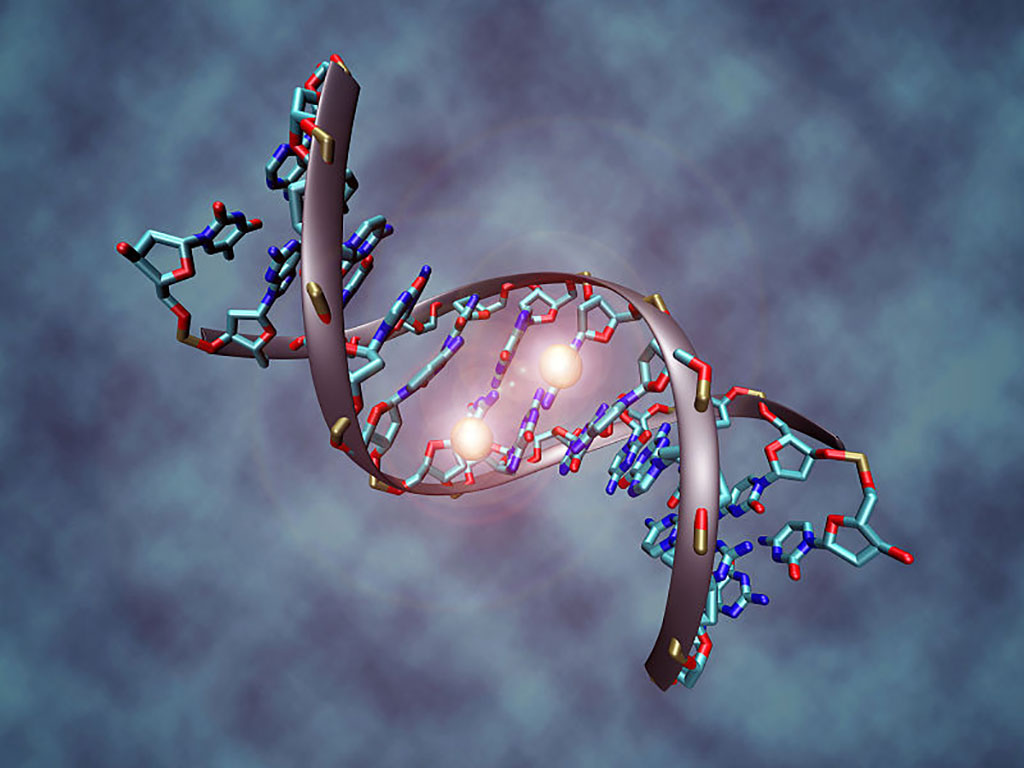Sensitive and Accurate Cancer Detection Through Analysis of Circulating Free DNA Methylation Patterns
By LabMedica International staff writers
Posted on 30 Jun 2020
An advanced liquid biopsy method for the detection and diagnosis of various types of cancer is based on the analysis of circulating tumor DNA methylation profiles.Posted on 30 Jun 2020
Definitive tumor diagnosis relies on tissue specimens obtained by invasive surgery. Noninvasive diagnostic approaches could provide an opportunity to avoid surgery and mitigate unnecessary risk to patients.

Image: This image depicts a DNA molecule that is methylated on both strands on the center cytosine. The two white spheres represent methyl groups (Photo courtesy of Wikimedia Commons)
In this regard, it has been found that tumor DNA circulates in the blood of cancer patients together with DNA from noncancerous cells. DNA methylation is an important determinant of human phenotypic variation, but its inherent cell type specificity has impeded progress on this question. At exceptional genomic regions, variation in DNA methylation between individuals occurs systemically. Like genetic variants, these systemic "interindividual" epigenetic variants are stable, can influence phenotype, and can be assessed in any easily obtained DNA sample. The set of nucleic acid methylation modifications in an organism's genome or in a particular cell is called the methylome.
A team of Canadian investigators, who are members of the University Health Network (Toronto, Canada), employed cell-free methylated DNA immuno-precipitation and high-throughput sequencing (cfMeDIP–seq), which is a highly sensitive assay capable of detecting early-stage tumors. In two papers published in the June 22, 2020, online edition of the journal Nature Medicine, the investigators described used of this method to diagnose brain and kidney cancers.
In the brain cancer study, the investigators tracked the cancer origin and type by comparing patient tumor biopsy samples with the analysis of cell-free DNA (ctDNA) in blood plasma samples from 221 patients. Using this approach, they were able to match the circulating plasma ctDNA to the tumor DNA, confirming the capability for identifying brain tumor DNA circulating in the blood. Then, using a machine learning approach, the investigators developed a computer program to classify the brain tumor type based solely on the circulating tumor DNA.
The same blood test was shown to accurately identify kidney cancer from circulating cell-free DNA obtained either from plasma or from urine.The method was tested on samples from 99 patients with early and advanced kidney cancer, 15 patients with stage IV urothelial bladder cancer, and 28 healthy, cancer-free control subjects. Following analysis of serum samples for ctDNA methylation patterns, the investigators reported accurate classification of patients across all stages of renal cell carcinoma (RCC) in plasma and demonstrated the validity of the assay to identify patients with RCC using urine cell-free DNA, although with somewhat less accuracy.
Senior author (on the brain cancer paper) Dr. Daniel De Carvalho, associate professor of medical biophysics at the University of Toronto (Canada), said, "The possibility to map epigenetic modifications genome-wide, combined with powerful computational approaches, has brought us to this tipping point. Molecular characterization of tumors by profiling epigenetic alterations in addition to genetic mutations gives us a more comprehensive understanding of the altered features of a tumor, and opens the possibilities for more specific, sensitive, and tumor agnostic tests."
Related Links:
University Health Network
University of Toronto














